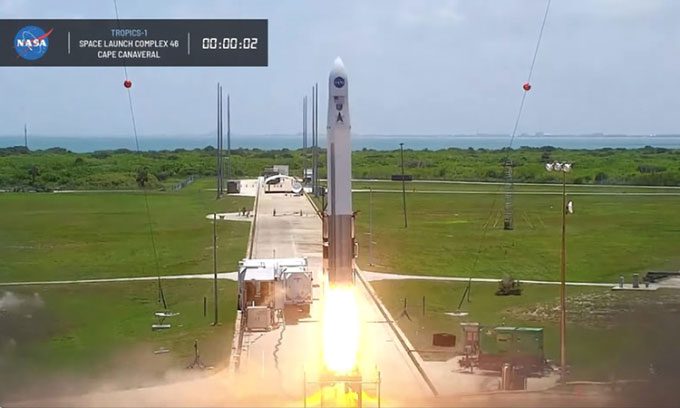A malfunction in the second stage of the rocket prevented Astra from launching two NASA storm monitoring satellites into orbit on June 12.
The rocket, designated LV0010, launched from Launch Complex 46 at Cape Canaveral Space Force Station in Florida, USA, at 1:43 PM local time on June 12, which is 12:43 AM on June 13 in Hanoi.

Astra rocket launching two TROPICS CubeSat storm monitoring satellites on June 12. (Photo: NASA)
The launch initially proceeded as planned, with the first stage lifting off for three minutes before shutting down its engines, deploying the payload fairing system, and separating from the mission. The second stage engine ignited quickly and was expected to burn for 5 minutes and 15 seconds but shut down after only 4 minutes.
“The upper stage shut down its engine earlier than expected and was unable to deploy the TROPICS CubeSats into orbit,” NASA’s Launch Services Program stated on Twitter.
In a pre-launch post on its website, NASA described the TROPICS CubeSats as “shoe box-sized” satellites designed to study the formation and development of tropical cyclones. The U.S. space agency plans to establish a network of six such satellites in low Earth orbit to enhance storm monitoring capabilities.
Last February, California-based startup Astra secured a $7.95 million contract to conduct three launches for NASA, each carrying a pair of TROPICS CubeSats.
With aspirations to become a key player in the small satellite launch market, Astra promises to provide frequent launches with greater flexibility compared to companies using larger rockets like SpaceX and Arianespace.
However, Astra has continually faced issues with their two-stage rocket. In February of this year, during another CubeSat mission for NASA, the second stage of the rocket also failed to reach orbit due to a satellite fairing release issue.
“We are very sorry for not being able to get the first two TROPICS satellites into orbit,” Astra’s CEO, Chris Kemp, wrote on Twitter on June 12. “Nothing is more important to us than the trust of our customers and the successful deployment of the remaining TROPICS satellites.”





















































